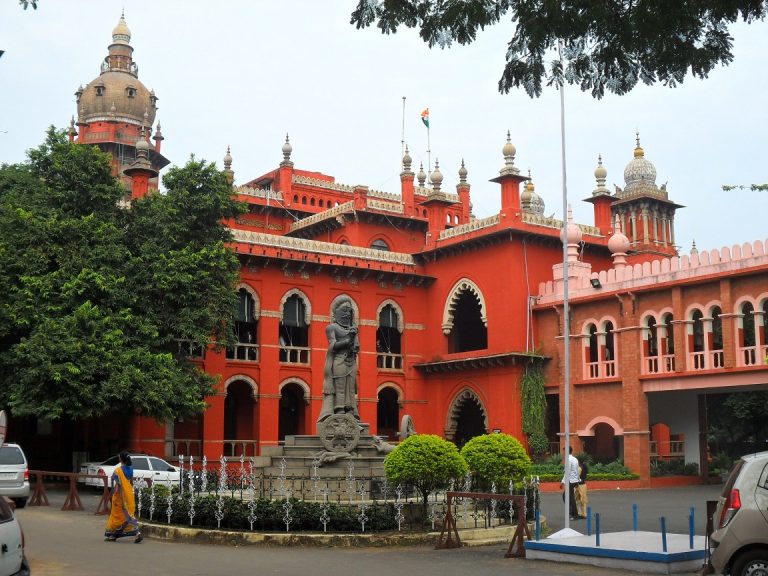
Above: Madras High Court/Photo: Wikimedia.org
In an attempt to solve the difficult case of a minor girl eloping with a much older married man, the Madras High Court has issued an order that is difficult to implement
By R Ramasubramanian in Chennai
In an interesting development, the Madras High Court in a recent order expressed shock and pain over the increasing trend of minor girls eloping with married men. Describing this as a disturbing trend with far-reaching consequences, the Court said that the time had come to curtail such practices. It also suggested that the state government introduce counselling programmes for teenage girls and their parents to sensitise them about this problem.
The issue cropped up on November 1 when a division bench of Justices N Kirubakaran and S Baskaran was hearing a habeas corpus petition filed by the mother of a 17-year-old girl who had eloped with a 45-year-old married man. The latter was earlier living with his wife. The bench was caught off-guard when told by the petitioner’s counsel that he had a 10-year-old daughter and immediately turned towards the additional public prosecutor. When told that this was the second instance that the minor girl had eloped with this man, the bench seemed irked.
The prosecutor told the bench that: “They eloped for the first time in June 2018. But the police traced them and while the minor girl was sent to her family, the man was arrested and sent to judicial custody. A case under Section 366, IPC (kidnapping, abducting or inducing a woman to compel her for marriage), was slapped against that man. However, a lower court granted him bail and after coming out of prison the man ran away with the girl once again.”
The interim order written by Justice N Kirubakaran said: “It is not the only case of such kind. Every day a number of cases are coming before this court with regard to minors eloping with their lovers, especially with aged and married people. Today itself, this court has come across four cases of this kind.” The bench then suo motu made the director general of police and social welfare secretary of the Tamil Nadu government respondents and directed them to answer nine questions in their replies. (see box)
 A section of lawyers welcomed this judgment. BV Vijayakumar, an advocate, told India Legal: “Justice Kirubakaran always stands with the people. His concerns are always with the common man. He is a humane judge and in that sense, I can call him a people’s judge. This judgment will definitely help society to arrest the unhealthy practice of minor girls eloping with older and married men.”
A section of lawyers welcomed this judgment. BV Vijayakumar, an advocate, told India Legal: “Justice Kirubakaran always stands with the people. His concerns are always with the common man. He is a humane judge and in that sense, I can call him a people’s judge. This judgment will definitely help society to arrest the unhealthy practice of minor girls eloping with older and married men.”
However, child rights activists saw it differently. “The Supreme Court in a 2012 judgment categorically stated that every case of a missing minor child must be considered one of human trafficking. This judgment was an outcome of a case filed by Nobel laureate and child rights activist Kailash Satyarthi. Human trafficking is done for various reasons—prostitution, bonded labour, organ stealing and begging. Just a few months back, the DGP had issued a circular directing all police personnel to treat every missing child case as one of human trafficking and hence, no lethargic attitude on the part of the police would be allowed,” said A Devaneyan, a child rights activist.
He added: “The issue of minor girls eloping with married/ older men is a smaller issue and has been going on for ages. But the main issue is human trafficking. If governments carry out the 2012 Supreme Court judgment and implement it in letter and spirit, we can to a large extent, curb human trafficking and eloping too.”
Another activist, V Prabhakaran, said: “There are already several government-controlled/monitored child protection bodies functioning in Tamil Nadu in all districts. These include child welfare committees, the Juvenile Justice Board, district child protection units, anti-human trafficking units, child helplines, etc. But one of the main problems is that there is no coordination between them.”
A retired senior police officer who did not want to be named said: “What Prabhakaran says is correct. There’s no synergy between these agencies. The bench asks why the government has not formed a separate wing to deal with such cases. But there is no need to form any special wing. The systems are already in place. What is required is complete coordination between all the players.”
He said that elopement is an age-old issue; what is important is to eradicate human trafficking. “Elopement is closely connected with the human psychology and cannot be addressed separately. In over 35 years of service in the police, I have come across several cases which are unimaginable. It is not a mere legal or social problem.”

